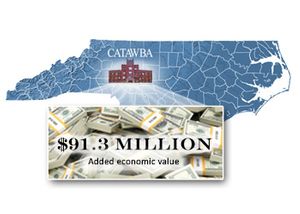
A comprehensive analysis of the economic impact of higher education in North Carolina has found that Catawba College created $91.3 million of added economic value during the 2012-13 fiscal year. That outstanding total is derived from a combination of Catawba's operations spending impact ($25.8 million), its students' spending impact ($2.1 million), visitors' spending impact ($246.1 thousand), and alumni impact ($63.2 million).
Overall, the public and private colleges and universities had an impact of $63.5 billion in state, including payroll, operations, the purchase of goods and services, start-up companies, and spending generated by students and alumni.
Catawba's economic impact analysis was part of a comprehensive N.C. Higher Education Economic Impact Study undertaken jointly by North Carolina Independent Colleges and Universities (NCICU - of which Catawba is a member), the University of North Carolina and the N.C. Community College systems. The study was conducted by Economic Modeling Specialists International of Moscow, Idaho, a provider of economic impact studies and labor market data to educational institutions, workforce planners, and regional developers in the U.S. and internationally. The results of the study, the first-ever multi-sector analysis of higher education's impact on the state's economy, were released during a collaborative press conference held February 18 at Research Triangle Park Headquarters.
Catawba's $91.3 million overall impact includes payroll and operations spending of the College, together with the spending of its students, visitors, and alumni. This added regional income, EMSI indicates, is equivalent to creating 1,512 new jobs.
"Private higher education has been a critical part of North Carolina's economy for more than two hundred years and that impact continues to grow as we increase partnerships with our public higher education partners," notes NCICU President, Dr. A. Hope Williams. "From our small liberal arts colleges to our comprehensive and research universities, private higher education affects all aspects of the quality of life of North Carolina citizens."
Students attending Catawba during the 2012-2013 fiscal year paid a total of $23.1 million to cover the cost of tuition, fees, books, and supplies. These students also forwent another $9 million in money that they would have earned had they been working instead of learning. In return for the money students invest to earn their degrees, they will receive a present value of $109.6 million in increased earnings over their working lives. This translates to a return of $3.40 in higher future income for every $1 that students invest in their education. The average annual return for students is 13.9%.
From a societal perspective, North Carolina as a whole will receive a present value of $549.2 million in added state income over the course of these Catawba students' working lives. Communities will also benefit from $63.5 million in present value social savings related to reduced crime, lower unemployment, and increased health and well-being across the state. For every dollar that society spent on education at Catawba during the 2012-2013 analysis year, N.C. will receive a cumulative values of $11.80 in benefits, for as long as Catawba's 2012-2013 student remain active in the state workforce.
From a taxpayer perspective, the net present value of the added tax revenue stemming from higher student incomes and increased business output will amount to $53.2 million in benefits to taxpayers. Savings to the public sector will add another $11.3 million in benefits due to a reduced demand for government-funded services in North Carolina.
The 36 campuses of NCICU, which together enroll almost 90,000 students from around the world, generated a combined $14.2 billion in added state income. This includes more than $4 billion on payroll and benefits for 66,309 full-time and part-time employees and $6.8 billion on goods and services to carry out their day-to-day operations, research, and clinical activities. The rest comes from construction and the spending of their students, visitors, start-up companies, and alumni, which in turn creates more spending and employment across the state. The added state income, or additional Gross State Product, of $14.2 billion created by NCICU's institutions is equal to approximately 3.2% of the total Gross State Product of North Carolina, and is equivalent to creating 219,590 new jobs.
The full report and NCICU sector report are available at: www.ncicu.org/economic-impact-2015. The study was funded by the North Carolina Business Higher Ed Foundation, the N.C. Community Colleges Foundation, the University of North Carolina system, and NCICU campuses, including Catawba College.
